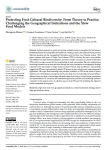Mariani M., Casabianca F., Cerdan C., Peri I. (2021). Protecting food cultural biodiversity: from theory to practice. Challenging the geographical indications and the slow food models. Sustainability, 01/05/2021, vol. 13, n. 9, p. 1-22.
https://doi.org/10.3390/su13095265
https://doi.org/10.3390/su13095265
| Titre : | Protecting food cultural biodiversity: from theory to practice. Challenging the geographical indications and the slow food models (2021) |
| Auteurs : | M. Mariani ; F. Casabianca ; C. Cerdan ; I. Peri |
| Type de document : | Article |
| Dans : | Sustainability (vol. 13, n. 9, May 2021) |
| Article en page(s) : | p. 1-22 |
| Langues : | Anglais |
| Langues du résumé : | Anglais |
| Catégories : |
Catégories principales 04 - DEVELOPPEMENT LOCAL ET REGIONAL ; 4.3 - Appellations liées au Territoire. Produits du Terroir. QualitéThésaurus IAMM ALIMENTATION HUMAINE ; BIODIVERSITE CULTURELLE ; INDICATION GEOGRAPHIQUE PROTEGEE ; LABEL DE QUALITE ; PRODUIT REGIONAL ; DEVELOPPEMENT DURABLE ; COMMUNAUTE RURALE ; FROMAGE ; PATRIMOINE ; FRANCE ; MAROC ; ITALIE |
| Résumé : | A global expansion in public and private initiatives seeks to strengthen the link between traditional products and sustainable development by creating a niche in the market for these products. Relevant examples are the Geographical Indications and the Slow Food Presidia models. This paper compares both types of Origin Food Schemes (OFS) to disclose the main commonalities and differences in their institutionalization, and their complex outcomes on cultural biodiversity (CB), which is a major concern for the sustainability of rural communities. We used underpinning knowledge dynamics as an analytical lens through the cross-comparison of ethnographic findings collected in four case studies of origin cheeses located in France, Italy and Morocco. Our findings suggest that OFS have high potential to defend CB because of their collective and context-dependent approaches. We argue that knowledge and practices mobilized in OFS are the result of power relations and confrontations among local actors, and show how four identified tensions between different forms and types of knowledge differently shape food culture, food technique, perceptions, and representations. In conclusion, the institutional approaches, practices and knowledge dynamics compared in this analysis show six effective ways to link OFS and CB, facilitating the trajectory toward sustainable development. |
| Cote : | En ligne |
| URL / DOI : | https://doi.org/10.3390/su13095265 |







